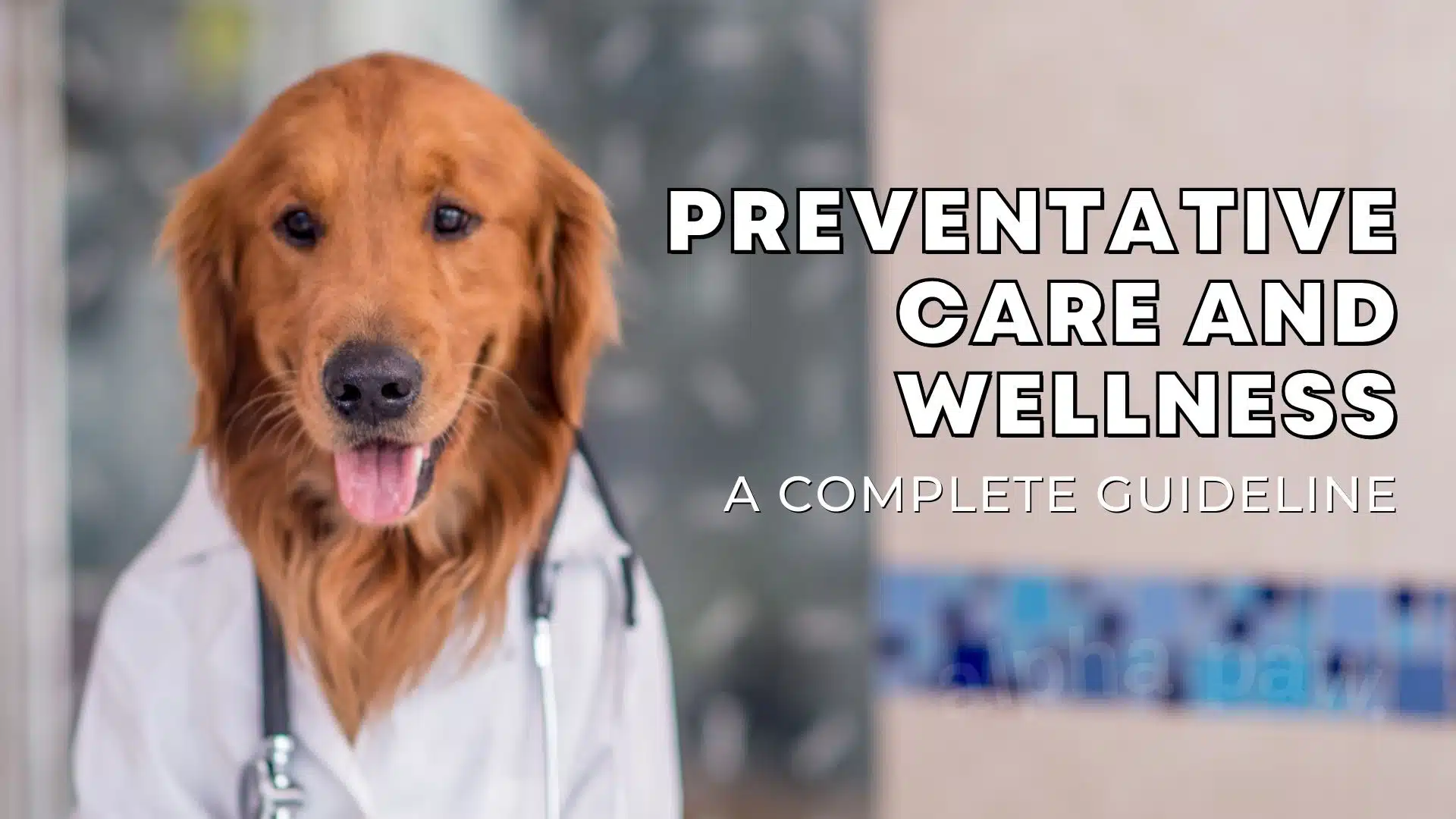

From vaccinations and the right dental care to routine exams such as blood tests or screening for various diseases, you’ll find all of the preventative care and wellness tips for dogs in this article! So, if you want your canine friend to have a healthy and happy life, keep on reading!
Preventative care for dogs means keeping your dog healthy and happy to ensure they are in optimal health. Since dogs can develop a variety of conditions ranging from infectious diseases such as Parvo or Distemper to intestinal parasites, fleas, ticks, or periodontal disease, pet owners should know that official preventative wellness plans now exist.
Both the American Animal Hospital Association and the American Veterinary Medical Association have come together to develop guidelines to assist pet parents in preventing these conditions and making sure that their dogs’ health status is always on par. In the following sections, we’ll discuss what these guidelines include.

One of the first steps in preventative care for dogs is vaccinations. Some of the most important vaccinations are given to a dog during the first year of its life. There are many vaccines for dogs these days, but they can be split up into two major categories: core and non-core vaccines.
Core vaccines are those that can protect your dog against serious infectious illnesses such as parvovirus, distemper, or rabies. On the other hand, non-core vaccines have to be administered to dogs depending on their life situations.
For example, in some areas of the United States, your vet could recommend that you do opt for a non-core vaccine against Lyme disease simply because your puppy has a higher risk of catching it in that region.
Is your pet safe?
1 in 3 pets will need emergency veterinary treatment each year and it is estimated a pet receives emergency care every 2.5 seconds in the U.S.
The average cost of treating a broken bone in dogs is $2,700. Cancer treatments? Up to $10,000.
It’s why so many pet owners say their biggest regret isn’t the vet bill—it’s not having pet insurance when they needed it most.
Ask yourself: “If an unexpected $5,000 vet bill hit tomorrow, could I afford it?”
If the answer is no, it’s time to get covered.
Take a look at Lemonade. They have a great app that actually works, they have an instant chatbot that is faster and, dare we say it, friendlier than most companies’ “real” customer service and a quick scroll through Reddit will uncover… people are really vibing with this brand.
So go check them out and take a look. It takes less than a minute.
Another non-core vaccine is the one against Kennel cough, which should in fact be mandatory for the healthcare of dogs commonly used for breeding. They tend to live in canine communities, so if they are not vaccinated and one case of kennel cough appears, all of the dogs can easily become infected.
Puppies have to be administered a vaccination plan which could last for up to three or four months depending on the vaccination scheme your veterinarian opts for. Following this period, your dog will have to receive booster vaccinations every year so as to control and prevent the spread of infectious diseases.
A visit to the vet for these vaccinations is necessary every year, but you should know that some vaccines (such as rabies one) can protect your dog for up to two years, not one, depending on their type.

Preventive health care largely relies on making sure that your dog gets a routine veterinary examination on a regular basis. Depending on your dog’s age, this could mean that vet visits have to happen once a year, twice a year, or more. Maintaining these routine visits is especially important in preventative care for dogs. When they miss a routine checkup, health issues that have developed since the last checkup may go unnoticed, leading to more serious health issues.
A senior dog can develop a chronic disease that makes physical examinations necessary more often, so biannual veterinary visits are usually needed after the age of 7. Senior pets also have to go through more detailed dental care exams. Between the ages of one and six, healthy adult dogs should benefit from at least one yearly vet exam.
Choosing the best multivitamins for your furry friends is a key step in ensuring their overall health and happiness. Look for supplements specifically designed for your pet’s species and size, providing a well-rounded mix of essential vitamins and minerals. These multivitamins can contribute to their immune system, promote a healthy coat, and support their energy levels.
Some dog breeds can be predisposed to developing certain health conditions that are hereditary. For example, a German Shepherd or a Labrador Retriever is much more likely to get hip dysplasia than any other dog breed.
For this reason, early screening can play a huge part in the prevention and adequate treatment of such a condition. Potential dog owners should know that some pets are at a higher risk of developing some diseases, so we recommend that you do your research before buying a puppy.
Small dog breeds such as Chihuahuas, Yorkshire Terriers, or Poodles are more likely to develop teeth problems, which is why dental care is extremely important in their case.
If you do adopt or buy a certain breed that could develop a genetic body condition such as IVDD in Dachshunds, you should be aware that regular veterinary care is of utmost importance.

Internal and external parasite testing is an essential part of preventive health care in all dogs, regardless of their age or the other health issues they might have. Preventative care for dogs means regular testing is a must!
Your veterinarian can recommend heartworm testing if you live in a location where mosquitoes are known for transmitting this condition. In fact, all dogs have to be tested every year so as to make sure that the heartworm prevention program is actually working.
As for the rest of the internal parasites that your dog can get from the outdoor environment or from other pets they come in contact with, your veterinarian can advise you as to how often you should deworm your canine friend. More often than not, you should aim at deworming your dog once every 3-4 months and examining their feces so as to make sure that there aren’t any eggs or larvae in them.
If you do find any parasite eggs, adults, or larvae, you should take your dog in for a vet visit or at least administer a second dose 7 to 10-12 days after the first. Unfortunately, not all parasites have the same life cycles, which means that the second and potentially the third dose have to be administered differently depending on the type of parasite your dog has.
To give you an example, the standard second dose of the dewormer has to be administered to dogs that have tapeworms 12-14 days after the first. However, if your dog has roundworms, the second dose should happen around 7 to 10 days after your pet has received the first.
Flea and tick prevention is another aspect that needs to be managed as best as possible. Healthy dogs can develop a variety of diseases because of these fleas and ticks, so year-round protection can be essential.
Ticks can transmit anything from Lyme disease to Rocky Mountain Spotted Fever, Babesiosis, and Anaplasmosis. If you do not spot the signs of these diseases early on and you don’t take your pet to the vet hospital for an exam as soon as possible, you’re effectively putting your dog’s life and health at a risk.
These days, there are many products that can prevent your dog from getting fleas and ticks. The most convenient ones are spot-on solutions, some of which can have a protection date for up to 2-3 months.
Your dog’s dental health can influence the way the rest of their body functions. Did you know that a pet that has dental disease is more likely to develop cardiac health issues? Besides being essential for feeding, your dog’s teeth and gums are also the first barriers that they have against microorganisms.
When you bring your puppy to the animal hospital for the first time, your veterinarian is likely to recommend an oral care routine. It could involve using mouthwash for dogs or brushing your dog’s teeth once every several days.
Mouthwashes are extremely easy to use as they are, in fact, water additives that make it more difficult for tartar and plaque to build upon your dog’s teeth. Tooth brushing might be a less enjoyable part of dental care, especially when performed on the internal side of your pet’s teeth, but it is excellent for preventing periodontal disease and other oral health complications.
Try to think of a dental preventive care routine that your dog can get used to without turning it into something they loathe. Reward your dog with a dental snack or with playtime so that they have something to look forward to.
When you take your pet to the animal hospital for routine exams, ask your veterinarian to perform dental disease screening, too. Whether it consists of a clinical exam or something more delicate such as tartar removal, preventive oral healthcare can keep your dog’s gums and teeth healthy for a long time.
If your pet isn’t meant to be used for breeding, you should consider neutering or spaying as soon as possible. A puppy can be ‘fixed’ when they reach the age of six months. In female puppies, especially, spaying can be an early preventive method against health complications such as uterine infections or mammary cancer.
In male puppies, on the other hand, it can be a prevention method for prostate cancer. Although pet owners tend to think that they should leave their puppies to experience their first heat cycle or even have a litter to be healthy, the truth is that it’s not necessary.
Naturally, you will want your pet to look like a healthy adult. That is why spaying or neutering dogs before the age of five months are not advised as the procedure can interfere with their growing process. Your veterinarian can supply you with more information in this sense, so don’t be afraid to ask.
Food is an important part of wellness and preventive care, especially in dogs. Of course, the food you give your pets should depend on their age, physical health, breed, skin health, and a number factors that can all influence the body condition of any animal. It also depends on their breed. Small dogs such as Dachshunds have different needs than a large Great Dane.
Any foods you give your dog should have key ingredients to sustain its health. Be sure to read the reviews. Just because a dog food touts wellness doesn’t always mean it will deliver on its promise.
If your fur buddy starts showing signs of eating issues including eating its own poop, you may want to take him the to vet sooner rather than later. It could be a sign of a more serious issue. Additionally, if you want to switch dog food, you may also need to consult your vet.
During your visits to the animal hospital, ask your vet what they believe the appropriate diet for your adult, puppy, or senior pet is. They are aware of the physical conditions Fido is suffering from, so they’re the best to advise you on the right feeding schedule and specific nutrition.
If puppies do not get the right nutrition or the right amount of exercise, they can be more likely to become obese. Obie was a Dachshund who weighed almost three times as much as he should because of his poor diet and lack of exercise. Thankfully, his story had a happy ending. His story showed that the quality of the diet you give your dog has a lot to do with his overall health.
Although they are omnivorous, especially when compared to cats, dogs should have as little grain as possible in their diet. Unfortunately, these days you might find that a lot of commercial diets, especially kibble, contain low-quality ingredients such as corn or wheat.
Keeping pets’ weight in check should be a part of your wellness and prevention care goals, but so should making sure that your dog gets enough physical exercise. Once a week, take your dog out for a long hike or walk in the park for at least two hours. Spending quality time with your pooch is important both for their body, but also for their mind.
Puppies are at the highest risk when it comes to household hazards as they are at the age when they’re curious and want to learn about the world around them as much as possible. Some common household foods are also toxic to dogs and should be avoided at all costs.
Dogs should be protected against potentially dangerous items in your home, such as the following:
Although it might not seem like the most important aspect of wellness and preventive health plan, grooming can be quite so. First of all, every dog’s skin needs to breathe. If you have a long-haired breed and you don’t tend to regular grooming, they could easily develop mats. Making sure they can groom themselves as well as regular visits to the groomers will make a huge difference in the quality of their lives.
The worst thing about mats is that they can hide serious skin conditions and they can’t be removed in any other way than by using electric clippers. You don’t have to give your dog a haircut on a regular basis, but you do have to brush their hair. Chances are your pooch is going to love the care and attention from you, so both of you will be happy.
Grooming also refers to keeping your dog’s nails nicely trimmed. Our own Nail Trimmer for Pets, is, in fact, a grinder, which means that it’s completely safe and easy to use.
This is not officially part of a wellness plan for pets, but there should still be some consideration. Pet insurance is an often overlooked and under ultilized addition to the wellness program of your pet. Similar to human health insurance, pet insurance covers many procedures that keep your pet healthy and happy. While many pet owners reject the idea of paying a monthly premium for their pet’s insurance, one can argue, when your pet suffers an unforeseen health issue, the pet insurance will go a ways to reducing the cost of vet visits, medication, and even medical procedures.
Nutrition
Your veterinarian will recommend an appropriate diet depending on what age your puppy is. Feeding is what’s most complicated about caring for a puppy. For example, between the ages of two to three months, they have to receive food four or even five times a day.
Between 3 and 6 months, the feeding schedule involves giving food to your puppy three times a day. Once they are older than six months, you can give them food twice a day.
However, feeding small portions throughout the day is much healthier than having to do it once or twice a day, even as your dog grows older, and can even prevent potentially life-threatening conditions such as bloat (volvulus).
Preventing parasites
Puppies have to get certain vaccines and medications for prevention including heartworm meds and dewormers for intestinal parasites. Your veterinarian can also recommend the appropriate flea and tick products for this stage keeping in mind that higher concentrations can be toxic to young puppies.
Vaccines
Puppies need several rounds of core vaccinations during the first year of their existence. It’s extremely important to get your dog fully vaccinated when they’re young. Blood screenings might be less necessary for most puppies, but they can still be a very useful test for some health problems.
Nutrition
Adult dogs have to be fed two to three times a day with a quality diet that contains as little grain as possible. Up to the age of seven, some dogs can become prone to obesity, which is why you should try to stick to the pet food manufacturers’ care instructions (which can usually be found on the label) and keep in mind that treats have calories too, so they quickly add up.
Parasite prevention
Adults have to receive dewormers for preventing intestinal parasites every three to six months. Heartworm medication can be necessary in some cases and depending on the area you live.
Exercise
Getting plenty of exercise can keep a dog happy and can also prevent some health problems, especially osteo-skeletal ones. Keep in mind that large breeds grow slower, so they reach adulthood when they are about two, not one. Up to that age, their training needs are moderate, so don’t overdo it.
Disease control
For any healthy adult pooch, a vet visit is necessary once a year. If your dog is in pain or you see signs of skin or general illness, take them to the vet for blood tests and a physical exam. A yearly visit to the vet also involves booster vaccinations.
Food
After your dog has reached the age of seven, they will begin to need fewer calories. Their activity might decrease, so they are not going to require the same amount of fuel as a young adult. Senior and geriatric dogs should also eat very high-quality food with protein coming from good sources such as fish or lamb (which can also prevent certain skin issues).
Pain management
It’s not uncommon for senior dogs to show signs of chronic diseases such as arthritis. Talk to your veterinarian about what you can do to prevent or manage the pain that’s associated with these conditions. Giving your dog baths, buying a dog ramp to make it easier for them to get on and off the couch, or investing in a high-quality dog bed can all help your dog feel more comfortable as they grow older.
Disease control
Geriatric dogs have to get blood tests done more often compared to their younger counterparts. They also have to be taken to the vet clinic for check-ups more often, such as once every four to five months. By the time your dog is 10, they have probably developed a chronic condition, so they will need to be seen by a veterinarian more frequently. Booster vaccinations are necessary every year even for senior dogs.
Your dog is part of the family and just as family members have to get their regular checkups, so do your four-legged buddies. Once a health and prevention routine is in place, you can rest easy knowing you are doing the best you can for your dog!
Most of us train our dogs when they are puppies to jump up on furniture. We think it’s harmless (and easier than always lifting them), but for dogs, couches and beds are very high compared to the size of their bodies.
Every time they jump it compresses their back and applies enormous force to their joints.
It’s no wonder that an incredible 80% of dogs experience arthritis or joint pain by only 7 years old.
Luckily, there is a vet-recommended solution.
It’s the PawRamp by Alpha Paw. An adjustable ramp that allows dogs to safely get on and off couches and beds. PawRamp makes joining you in bed or on the couch effortless and fun.
As a bonus, you can use code SAVE35 to get $35 off the PawRamp today.

The medical, nutritional, or behavioral advice we provide is intended for informational and educational purposes only. Our editorial content is not a substitute for formal or personalized medical advice from a veterinary professional. Only board-certified veterinary specialists who have examined your pet should diagnose medical conditions, provide personalized treatment, or prescribe appropriate medication. For questions regarding your pet’s health, or if your pet is exhibiting signs of illness, injury, or distress, contact your veterinarian immediately. Never disregard professional medical advice or delay in seeking it because of something you have read on our site.